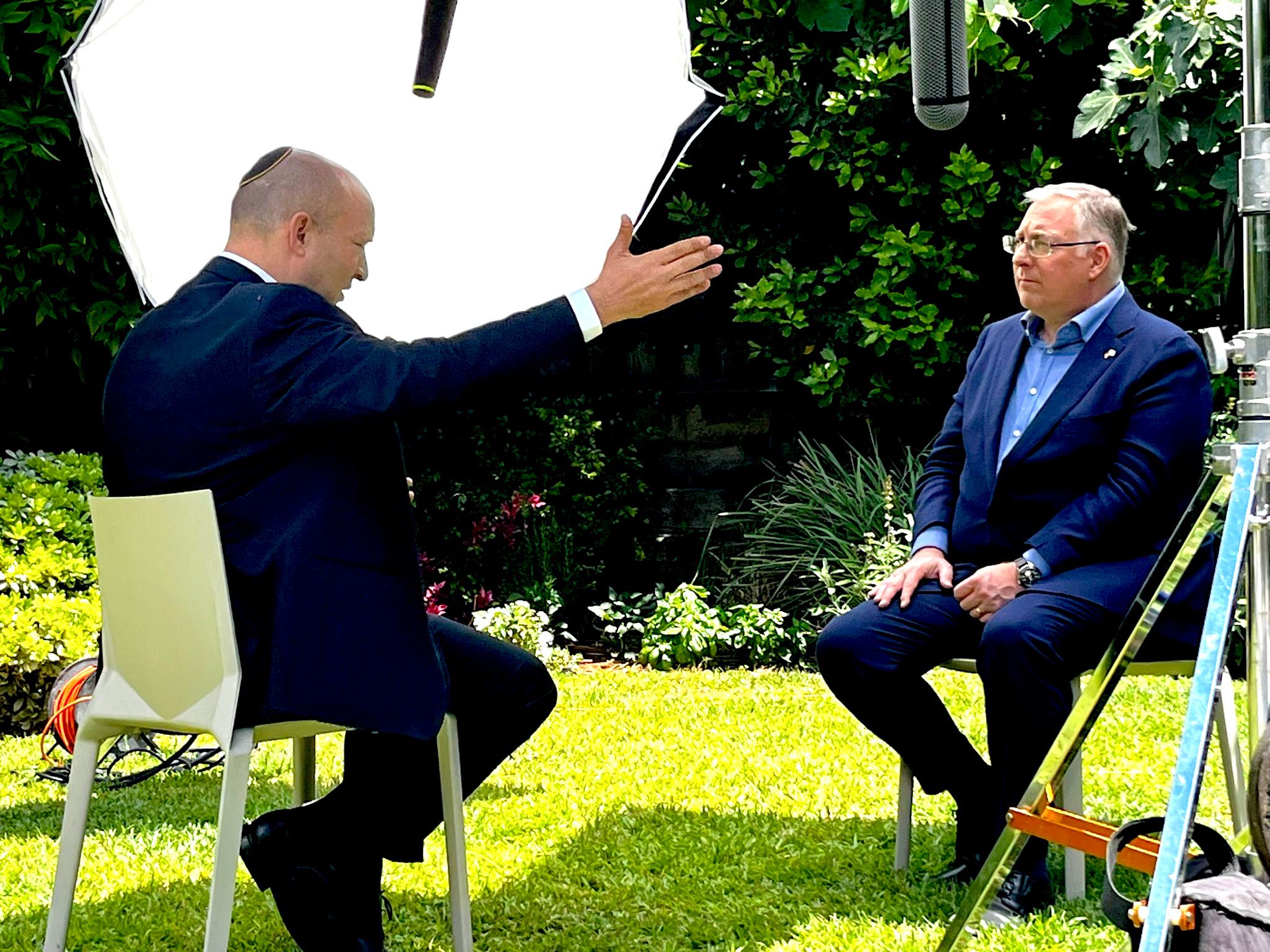Fmr PM Naftali Bennett tells THE ROSENBERG REPORT: Israel’s rebirth is fulfillment of Ezekiel 37 prophecies, it’s time to get tougher with Iran, and two-state solution blew up in our faces twice

JERUSALEM, ISRAEL – Israelis this week have been celebrating the 76th anniversary of the Jewish state’s modern rebirth in May 1948.
We are also grieving the death and the wounding of so many of our fellow citizens this year, as well as the 253 who were taken captive by Hamas.
What does it all mean?
Where is this all going?
To better understand Israel’s past, present, and future, I reached out to former Israeli Prime Minister Naftali Bennett to get his views.
COMPELLING AND CONTROVERSIAL
After all, Bennett is one of the most compelling – and controversial – leaders in Israel today.
He made history in June 2021 by becoming the country’s first Orthodox Jewish, kippah-wearing, kosher-keeping, religious prime minister.
Since the founding of the state in 1948, not a single other premier has been religious and openly so.
Bennett also made history by helping Knesset Members Yair Lapid and Benny Gantz topple (however briefly) the enduring tenure of Benjamin “Bibi” Netanyahu and ushering in a new coalition government made of parties on the right, in the center, and on the left, as well as including the first Israeli Arab party ever to join the government.
This is what makes him so controversial.
Years ago, Bennett was Netanyahu’s chief of staff and one of Bibi’s closest political aides and allies.
But they had a serious falling out with both Bibi and his wife, Sara.
Bennett left Netanyahu’s employ, and the Likud party, started his own party (“Yamina,” meaning rightward in Hebrew), and then dramatically rose to power.
For some on the right, Bennett will forever be branded a traitor.
He doesn’t care, believing it was time for change and a new generation and style of leadership.

POLLS SHOW BENNETT MORE POPULAR THAN EVER
Today, polls show that Bennett would be very warmly welcomed back if he chooses to get back into politics.
One recent poll indicated that should Bennett create a new center-right party, he would win 12 seats in the next election.
Another poll suggested Bennett could gain as many as 18 seats.
The most recent poll shows that if Bennett teams up with former Mossad Chief Yossi Cohen and former Justice Minister Gideon Sa’ar, they could win as many as 32 seats.
If so, Bennett could once again topple Netanyahu and once again emerge as prime minister.
BENNETT GRACIOUSLY INVITED ME TO HIS HOME
So, who is Naftali Bennett and what does he believe?
We had met before.
I interviewed him in late October of last year, soon after the war broke out.
But we only had about 15 minutes together.
This time, Bennett very graciously me to come to his home in central Israel and to bring a TBN television crew to record a one-hour interview for THE ROSENBERG REPORT.
It was such a fascinating conversation and wide-ranging conversation that I honestly didn’t know what to cut out.
So, I decided to create a three-part series.
The first part aired last night at 9 p.m. EST in the U.S. (and will re-air on Saturday night at 9:30 p.m. EST) on TBN, the most-watched Christian TV network in the United States.

IS MODERN ISRAEL A FULFILLMENT OF ANCIENT PROPHECIES?
The first question I asked Bennett is whether he believes that modern-day Israel is a fulfillment of ancient Biblical prophecies.
After all, I noted that not every Israeli does.
The country was founded by atheists, agnostics, and far-left socialists.
Even today, many Israelis are quite secular and think little – if at all – about the Bible or the ancient Hebrew prophets.
When I interviewed former Prime Minister Ehud Olmert a while back, for example, he absolutely rejected the idea that modern Israel has any connection to prophecy.
But Bennett is different.
“I absolutely see a connection between our ancient past, our biblical past and our present and future as an eternal chain to the Jewish people and the land of the Jewish people,” he told me as we sat for the interview in his backyard.
“I see a continuity between Abraham, Isaac, Jacob and Moses, Joshua, King David,” he added. “And then during the First and Second Temple, later in the diaspora for 2,000 years, we were praying for our home three times a day. All the Jews prayed to come back to Jerusalem. And then, indeed, the return of Jews from all across the world. That's precisely what's in the Bible.”
He added, “I think that modern-day Israel is the beauty of both modernity that gets intertwined with our biblical roots and our destiny.”
Later in the interview, he told me that he believes Israel is specifically the fulfillment of the prophet Ezekiel’s vision of the “Valley of Dry Bones,” found in Ezekiel 37.
TIME TO GET MUCH TOUGHER WITH TEHRAN
I asked Bennett – a former special forces commando in the IDF and a former defense minister – whether he was satisfied by Netanyahu’s response to Iran firing 320 missiles and suicide drones at the Jewish state a few weeks ago.
“I have a habit where I don't criticize my government on foreign press,” he told me.
But he hinted that he was by no means satisfied with the IDF’s pinprick, limited strike on an Iranian radar station.
“A response should be so big, so hard, and so painful that the other side will have to think a thousand times about it,” he said.
Bennett went on to say it’s time to get much tougher with Tehran.
He believes Iran should be handled according to what he calls the “Octopus Doctrine.”
He views the regime in Tehran as an octopus that sends its tentacles all across the Middle East to sow chaos and terrorize.
These are the Iranian-backed proxies such as Hamas in Gaza, Palestinian Islamic Jihad (PIJ), Hezbollah in Lebanon, the Houthis in Yemen and the militias in Syria and Iraq.
“There are two options,” Bennett explained. “One is to begin fighting all around. But another is to focus on the head of the octopus and strangle it until it collapses. That's what America did to the Soviets throughout the 1980s.”
“There was never a need for America to attack the Soviets,” he said. “America never bombed the Soviet Union, yet the Soviet Union collapsed from within. Same thing will happen in Iran.”
Bennett believes that Israel and the United States should together take on the Iranian regime directly, but in a way that an all-out kinetic war can hopefully be prevented.
“I'm talking about economic, intelligent warfare, cyber, covert and overt [options],” Bennett said.
“I'm talking about empowering the opposition in Iran to fight the regime. If we are very aggressive on the world stage in isolating Iran and weakening that regime, I think we can avert the war.”
Yet, Bennett is not ruling out the use of massive military force against Iran.
He also revealed that during his tenure as prime minister from June 2021- 2022, in several cases, when Israel was attacked indirectly by Iran, it responded directly to Iran.
“I think that should be the way we operate,” he said. “When Iranian proxies like Hezbollah, Hamas, Islamic Jihad, shoot rockets at Beersheba or at Tel Aviv, we shouldn't only be fighting the arms [of the octopus]. Someone in Tehran should be paying a price.”
Against this perception, Bennett weights the meaningful role that he has played so far in the journey of the Jewish people in their biblical homeland. When he stepped in to replace Netanyahu, the two of them had a 20-minute meeting in the Prime Minister's Office.

NO EVIDENCE A TWO-STATE SOLUTION WOULD BRING TRUE PEACE
How does Bennett view the horrors of October 7th? I asked.
“Well, Joel, that's a very tough question,” he replied.
“I would say on October 7th, there are two halves of the story.”
“The first is that Israel had a colossal, epic failure that should never have happened. Failure in intelligence and operations… a total meltdown.”
“But the second half of the story on October 7th was the rise of the Israeli people, the nation. I coined the term, 'a nation of lions.’”
“Thousands of Israeli young men and women from all around Israel that were not necessarily soldiers – that were reservists, that were policemen – got in cars and drove into harm's way down to the South.”
Even though institutional Israel has failed, Bennett stressed that the people of Israel “stood up to the plate.”
As for the U.S. handling of the situation, the former Israeli premier noted that both President Biden and the American people were “amazing in their deep, heartfelt support.”
However, he also acknowledged how concerned he is about the “waning of some support of Israel in some circles” in the U.S., including in some quarters in Washington.
“It's no secret that there's a meaningful disagreement regarding the goals of the war, regarding Rafah,” Bennett noted.
While Israel is determined to carry out an extensive military operation in Rafah to finish off the last four operational Hamas battalions in Gaza’s southernmost city, President Biden has expressed outrage over the idea and threatened to withhold congressional-approved weapons shipments into Israel if defied.
Despite the ultimatum from the White House, Bennett is convinced that Israel should plow ahead.
“I think we have no choice. I think we have to go in and dismantle Hamas. Hamas cannot be left standing.”
Another point of contention between Jerusalem and Washington is the plan for Gaza in the day after Hamas.
The Biden administration keeps insisting that a two-state solution based on the 1967 borders is the only way to achieve peace between Israelis and Palestinians, including normalization of ties with Saudi Arabia.
The U.S. says it wants to see a “revitalized” Palestinian Authority in control of Gaza.
Bennett vehemently opposes that notion.
“The Palestinian Authority today is part of the problem, not part of the solution,” he said.
“They are teaching incitement in their schools, in the mosques, in the media. They are calling again and again to say that Jews ought to be killed. They actually have a menu of how much you get paid for – based on how many Jews you kill. It's called pay-to-slay.”
He explained that Israel, in fact, has tried the so-called two-state solution twice – in both Gaza and the West Bank – and it has utterly failed.
“It blew up in our faces,” he stated.
In the Second Intifada, some 4,400 Israelis were killed by violence and terrorism emerging from the West Bank.
Then came the Hamas invasion of October 7.
“Israelis have very little appetite for this experiment the third time,” Bennett said.
A MESSAGE TO EVANGELICAL CHRISTIANS
The once-and-possibly-future prime minister had much more to say on a wide range of issues covering Israel’s past, present, and future.
He also had a special message he wanted me to convey to Evangelical Christians.
I’ll share more of my conversation soon.
For now, I’ll simply conclude with this thought.
Bennett is not only a compelling and controversial figure in Israeli politics.
He’s also increasingly popular.
And I think he’s actively preparing for a comeback.
Stay tuned.

Joel C. Rosenberg is the editor-in-chief of ALL ISRAEL NEWS and ALL ARAB NEWS and the President and CEO of Near East Media. A New York Times best-selling author, Middle East analyst, and Evangelical leader, he lives in Jerusalem with his wife and sons.
You might also like to read this:














